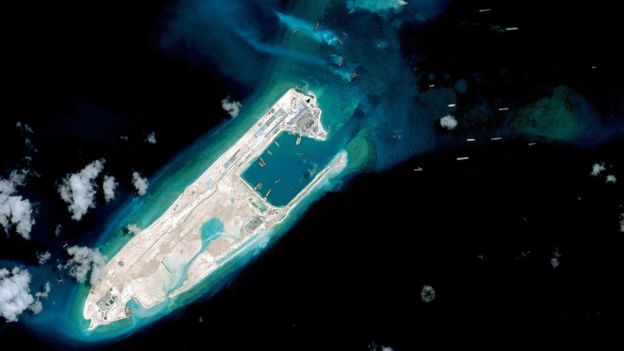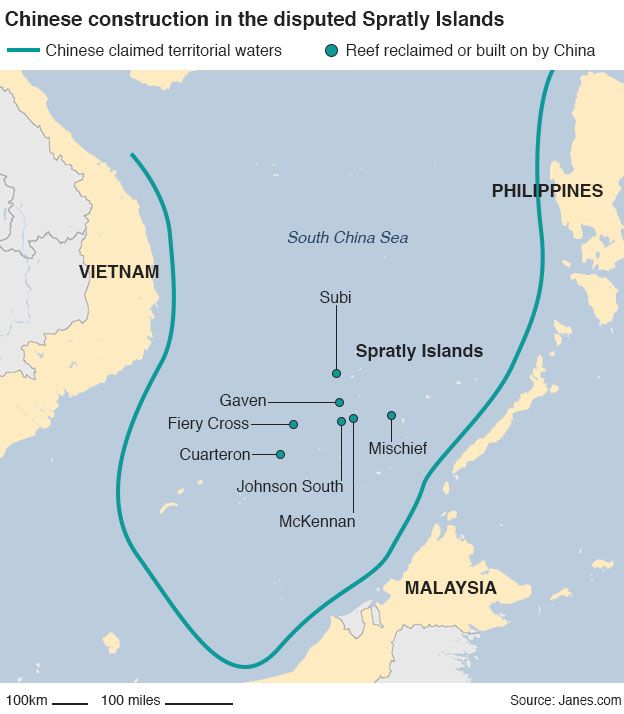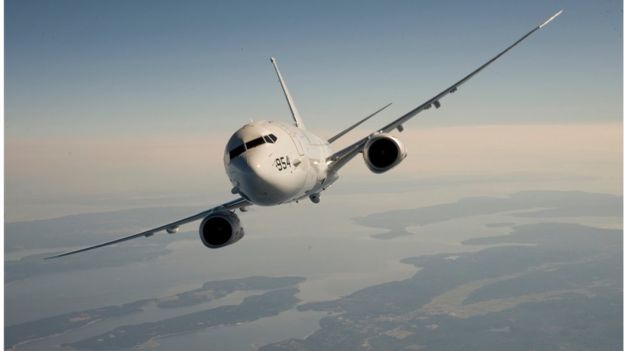Buried under the avalanche of reactions to presidential candidate Donald Trump's verbal attack against Muslims, the stream of headlines about the San Bernardino couple who shot and killed more than 14 people last week and the dissection of President Barack Obama's Sunday Oval speech about the war against the so-called Islamic State (IS) was a very significant announcement.
Singapore said it would allow the US to deploy a spy plane out of its territory to monitor Chinese activities in the South China sea.
The move, which angered the Chinese, comes at a time of heightened tensions in the area over China's building of artificial islands in disputed places.
It is a reminder that while Washington's thinking, bandwidth and resources, including military, seem continually consumed by the crisis and threats emanating from the Middle East, the more serious long-term challenge for US national security interests remains the management of its relationship with China.
The complexity crisis in US foreign policy is how security and defence analyst Anthony Cordesman at the Center for Strategic and International Studies (CSIS) describes it.
He talks of the need to handle multiple, urgent and important short-term and long-term crises at the same time and being reactive while formulating coherent long-term strategies.
It's a challenge that has frustrated the Obama administration. The president had hoped to disentangle the US from the Middle East and its wars during his time in office, only to find the region follows him everywhere: he had to answer numerous questions about his Middle East strategy, in the wake of the Paris attacks, during a trip to Asia last month.
The stops in Manila and Kuala Lumpur were meant to showcase a landmark trade deal - the TransPacific Partnership (TPP) - which leaves out China.
While the TPP is seen as a key part of the administration's much-vaunted rebalancing towards Asia - what Obama had conceived as a grand realignment in how the US approaches the world, once dubbed the Asia Pivot, has become more of a grinding daily and crucial exercise to keep up with Beijing.
The Chinese capital has emerged as a regional and world power at an unusual speed for a rising power, spreading its money across the globe as well as aggressively asserting itself in Asia.
South China Sea disputes
Tensions in the South China Sea because of disputes with other claimants like the Philippines and Vietnam are leading to alarming headlines about possible conflict.
China insists it is simply doing what all its neighbours are trying to do - but it is doing it at dizzying pace.
 Image copyrightAFP
Image copyrightAFPThe US Department of Defense assesses that as of June 2015, China had reclaimed 17 times more land in 20 months in the South China Sea than all the other claimants combined over the past 40 years.
China's exact intentions remain unclear, but the overall assessment is that Beijing wants to slowly push the US out of the area without causing a conflict.
Experts say that while China knows it cannot claim territorial sea based on land reclamations, the artificial islands will allow Beijing to have forward military bases and patrol the seas a long way away from China.
The Pentagon's report on Asia Pacific Maritime Security Strategy warns that: "China is unilaterally altering the physical status quo in the region, thereby complicating diplomatic initiatives that could lower tensions."
Anja Manuel, a former State Department official during the George W Bush administration, said: "China has no intention of challenging US military power globally, but they do want primacy in Asia and they like to pick off their adversaries one by one."
But China's military is also moving well beyond its usual focus on protecting the borders.

Beijing has just announced it will build its first overseas military outpost in Djibouti, a naval facility, not far from the US's own military base and its only one in Africa, Camp Lemonnier.
Economic muscle
In Pakistan, the Chinese signed $46bn worth of energy and infrastructure contracts.
The Chinese Pakistan Economic Corridor will open up new trading routes from Beijing to the Middle East.
China is also building a new Silk Road to Europe - a strategic economic agreement that could rival the TTP.
Last month, the IMF announced that the Chinese renminbi would join the world's basket of reserve currencies.
When China announced it was setting up an Asian Investment and Infrastructure bank, the US tried to strong-arm its allies in staying away, but 57 nations joined, including the UK.
The Asian Infrastructure Investment Bank
- Twenty-one Asian countries signed a memorandum of understanding on 24 October 2014 to establish the bank
- Led by China, headquarters will be in Beijing
- It will help finance construction of roads, ports, railways and other infrastructure projects in Asia
- The bank is expected to be fully established by end of 2015
- As of 15 April 2015, there are 57 prospective founding members - 37 from within Asia and 20 from outside the region
- Those from outside the region are: Austria, Brazil, Denmark, Egypt, Finland, France, Germany, Iceland, Italy, Luxembourg, Malta, Netherlands, Norway, Poland, Portugal, South Africa, Spain, Sweden, Switzerland, UK
All of this has led to criticism that Obama is not pushing back hard enough against an assertive China, with one analyst, Harry Kazianis, even claiming that the US has just handed over the South China Sea to Beijing, along with the annual $5tn of international trade that goes through it.
"There is concern about whether the US is doing enough to impose a cost on China for what is seen as destabilising behaviour," said Bonnie Glaser, a China expert at CSIS, who pointed out it took two years for the US to finally conduct freedom of navigation operations in the South China Sea to push back against Beijing.
"I am quite worried about the perception that the administration is not doing enough. It's a perception, even though some of the criticism is fair."
Direct conflict with China is highly unlikely, but the risks would be enormous and the impact on the US economy tremendous. US goods account for one-fifth of all trade passing through the South China Sea.
But accidents are possible and managing the relationship is an exercise in balance and subtleties that requires constant co-ordination with Asian allies, also in dispute with the Chinese.
"People want to know the United States is going to be a stabilising force [in Asia]," Ben Rhodes, Obama's deputy national security adviser, said recently. "But they also want us to have a good relationship with China."
 Image copyrightBoeing
Image copyrightBoeingMany experts think Obama has handled China well - but warn it is a work in progress, which will need to be continued by the next president, no matter how much China-bashing happens during the presidential campaign.
None of the world's long-term big problems, like climate change, can be resolved without Beijing - COP21 talks in Paris have been yet another reminder.
"You can see a positive track (in the relationship), where there's a climate change deal and trade is fairly open," said Manuel. "But that's not automatic, it's not necessarily the trajectory we are on."
A situation where the US is spending more and more on its military and trading less because of China is not inconceivable.
So if the headlines today are urgent and the crisis in the Middle East real, the long-term strategic implications for the US of mismanaging the relationship with China are worse.
Russia's unmanned Luna-25 spacecraft has crashed into the Moon after spinning out of control, officials say.
Donald Trump has confirmed that he will not take part in Republican presidential debates with his rivals in the race for the White House.


